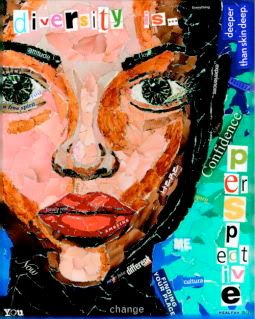How might your personal history/sociocultural characteristics intersect with those of your students? What challenges or advantages might you have as a teacher in this classroom? What misconceptions about various cultural groups have you confronted during this experience? 
My strongest belief has always been that that your environment and the way you were raised have the biggest impact on your views. Since no two people share the same pair of eyes, we all have our own bias and our own opinions. As stated by Lisa Delpit, "No one speaks from everywhere and no one speaks from everywhere."
If I were the teacher in this classroom, I would face both advantages and challenges. Coming from a Hispanic background, I can culturally connect with the students. Some days while I am observing the behavior and actions of the students, I can make a comparison to a child in my life with no problem, whether it be a cousin or a friend. This, I believe, would allow me to be more compassionate and forgiving with the child. As opposed to a teacher who is not culturally competent, who would not be able to make these personal connections and would therefore feel the complete opposite towards the child.
One of the biggest challenges which I am currently facing would be the language. Although I speak Spanish at home and I am exposed to at family gatherings, I have never taken a Spanish class at school. This enables me to be totally confident and comfortable speaking to the teacher or to the children. Most of the children there speak Spanish more properly than I do! (I get a kick out of this). Needless to say, I am a little quieter than I am when I am in a the classroom who’s main language is English. Although I do not feel completely comfortable having an educational conversation with Mrs. Berna in Spanish, when speaking with the children and doing a lesson with them, it is a little easier and I can throw in some English words. I have so far taught them a few phrases such as, "no peaking" and "thumbs up", during our lessons. The children love using these phrases and one little boy, Johnny, even told me that he told him mother about his new phrase, "no peaking". The children think it is funny when I say something in English but at the same time they are very eager to learn new words!
Although I work at a preschool where about 90% of the children are White, I was not faced with any misconceptions of cultural backgrounds while being in this classroom. As I said before, I am from a Hispanic and White background and therefore I am aware of the cultural differences. Although I was not faced with any, this doesn’t mean no one else was. Stereotypes are very strong and do exist.
Theorist Carlson said that we must challenge essentialist worldviews. Carlson said there are six ways in which we are primarily different. They are biologically fixed in our body and cannot be changed. These ways are, age, race, gender, physical attributes, ethnicity, and sexual orientation. These biological characteristics make us who we are, but it doesn’t stop there. There are also secondary differences, such as our beliefs, hair color, religion, career, and class. As a society, we cannot judge a person, or child, only because of one of these characteristics. We must rupture borders and realize that everyone is a complex person.
Sunday, April 11, 2010
Prompt #4 - CARLSON
Posted by Maria at 1:38 PM
Subscribe to:
Post Comments (Atom)

1 comments:
Maria,
The connection you made with this post to Carlson is really clear. I can relate in a few ways with my own experience with language. Coming from a Portuguese background, I understand what you mean by speaking the language at home but once in the real world it's a little different. I do find that other people speak more properly than I do sometimes (even if it is children!). However, aside from that I hope, like you, to become more comfortable speaking a foreign language not only to my future students but their parents as well.
Carlson also made a good point when dealing with the aspects of judging people based on race, age, ethnicity, etc. I hope to use this in my classroom to show students and hopefully their parents/families that everyone has their own viewpoints, backgrounds, and beliefs but in order to accept them, we must accept the person first. Relating to one another truly helps us see who each person is individually and I think you made a strong connection to that!
Good job and take care!
Liana
Post a Comment